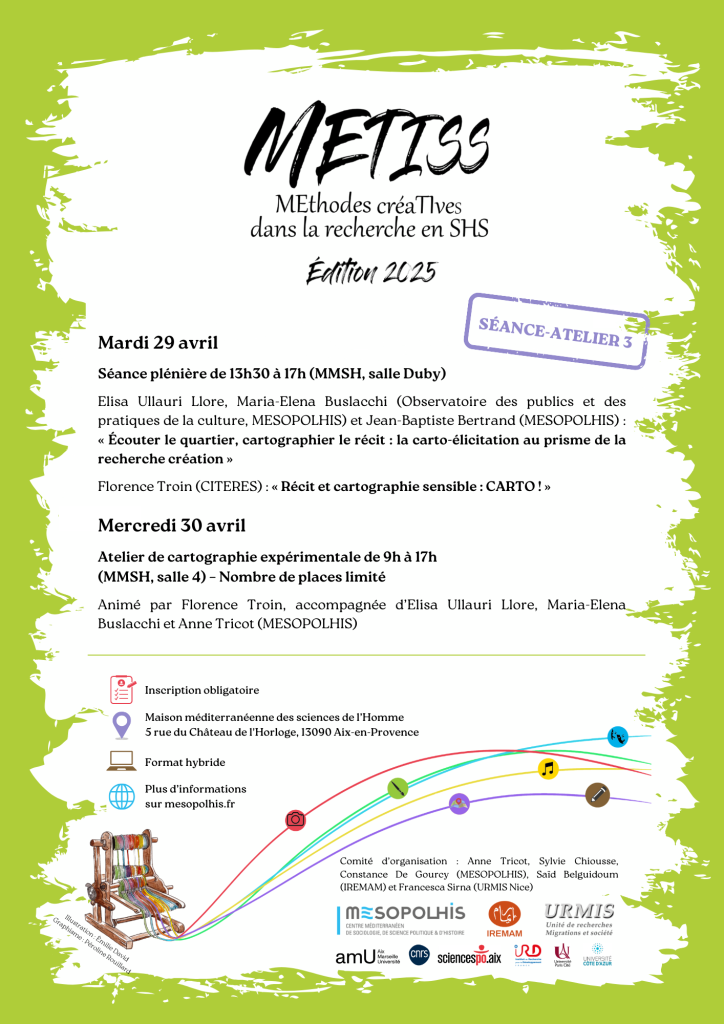METISS 2025 seminar, workshop session 3: «Sensitive maps and narratives».»
Details
For its first year, 2025-2026, the METISS seminar, "MEthodes créaTIves dans la recherche en Sciences humaines et Sociales", is launching a series of meetings devoted to
Details
For its first year, 2025-2026, the METISS, "MEthodes créaTIves dans la recherche en Sciences humaines et Sociales", is launching a series of meetings devoted to these approaches. The seminar is supported by three units MESOPOLHIS (CNRS, Aix-Marseille-Université, Sciences Po Aix), IREMAM (CNRS, Aix-Marseille-Université) and URMIS (CNRS, Université Côte d'Azur, Université Paris Cité, IRD). The aim of the seminar is to provide a monthly meeting place for researchers, doctoral and post-doctoral students, students and research support engineers.
The sessions, lasting around 3 hours, are scheduled to take place between February and December 2025. Some of them will be combined with workshops (April 2025 and the start of the 2025-2026 academic year) and will be reserved for PhD and Masters students as a priority.
The format is hybrid (face-to-face/videoconference). Registration is free but compulsory. To register and obtain the video link, please contact : Anne Tricot (anne.tricot@univ-amu.fr) and/or Sylvie Chiousse (sylvie.chiousse@univ-amu.fr)
Tuesday 29 and Wednesday 30 April 2025 | MMSH (rooms Duby and 4)
" Sensitive maps and stories "
Tuesday 29 April 2025 | plenary session 1.30 p.m. to 5 p.m. | MMSH (Duby room)
- Elisa Ullauri Llore and Maria-Elena BuslacchiObservatoire des publics et des pratiques de la culture, MESOPOLHIS (CNRS, Aix-Marseille University, Sciences Po Aix): " Listening to the neighbourhood, mapping the story: map-making through the prism of creative research ". Looking back at the transformations of the Marseilles waterfront through 60 sensitive maps produced between 2023 and 2024 during participatory workshops with residents and users of the Joliette district is an opportunity for us to question housing practices, usages and temporalities in the collective memory, while renewing our own link with the research. The disappearance of elements, the appearance of new landmarks, intertwined temporalities: each map embodies a statement about the territory in which we live, and the forms of attachment, resistance and adaptation in the face of urban change. Combining fieldwork and artistic collaboration, this ongoing research examines the way in which drawing and storytelling fuel reflection on the city, participation in artistic and cultural life and the link to the sea, while outlining new possible extensions.
- Florence TroinCITERES (CNRS, University of Tours): "Storytelling and sensitive cartography: CARTO! ". Florence will retrace her journey as a cartographer: little by little in the course of the narrative, objects, sounds and lights come to life around the creation of a sensitive map that becomes the main stage of the presentation.
Wednesday 30 April | workshop 9am-5pm | MMSH (room 4)
- Florence TroinCITERES (CNRS, University of Tours), accompanied byElisa Ullauri Llore, Maria-Elena Buslacchi and Anne TricotMESOPOLHIS (CNRS, Aix-Marseille University, Sciences Po Aix): workshop to produce a biographical sensitivity map.
- Limited number of participants: 15 on registration.

Don't miss a single session:
- Session 1: Sound and vision in the survey (Monday 24 February 2025, 13h30-17h, MMSH Germaine Tillion room)
- Session 2: Sounds, images and texts in the survey (Thursday 27 March 2025, 9.30am-12pm, MMSH salle Duby)
- Workshop session 3: Sensitive maps and narratives (Tuesday 29 April 2025, 13h30-17h, MMSH salle Duby | Wednesday 30 April 2025, 9h-17h, MMSH salle 4)
- Session 4 (in connection with MESOPOLHIS axis 2 'Migrations and mobilities'): photo-elicitation, mental maps and geographical memory (Thursday 15 May 2025, 13:30-17:00, MMSH salle Duby)
Find out more about the annual "MEthodes créaTIves dans la recherche en Sciences humaines et Sociales" (METISS) seminar:
Since the 2000s, there has been an explosion of work on creative research methods. In dialogue with the sciences, society and the arts, they are at the crossroads of social and human sciences disciplines (anthropology, sociology, geography, etc.) and are renewing the methods used to gather data and information. Not confined solely to the textual intelligence of the survey, a primary characteristic of these approaches is the use of a form of experimentation, a "methodological bricolage" that mobilises different media (drawings, photos, sound montages, games, maps, etc.). Designed and produced to suit the research, they act as "intermediary object(s)" in the researcher-participant interaction. These include (but are not limited to) visual methods (photo elicitation, participatory and/or mental mapping, commentary trails with photographs), immersive sound surveys, writing-based methods (writing workshops, notebooks), etc.
A second characteristic of these approaches is that they mobilise sensitive experience in the investigation, which refers in part to vulnerability and the experience of situations of violence, social and/or environmental disaster, or even domination. It also refers to our perceptive capacities, i.e. our senses and our representations. Making room for the sensitive means taking seriously the subjectivity of people, whose knowledge and skills are no less rational and objectifiable. In the final analysis, we are shifting the researcher's position towards the co-production of knowledge.
The presentations will look at what goes on behind the scenes in research, i.e. how methods are developed and their relevance to the research process.
Organising Committee :
- Anne Tricot, Sylvie Chiousse, Constance De Gourcy MESOPOLHIS (CNRS, Aix-Marseille-Université, SciencesPo Aix)
- Saïd Belguidoum IREMAM (CNRS, Aix-Marseille-Université)
- Francesca Sirna URMIS Nice (CNRS, Université Côte d'Azur, Université Paris Cité, IRD).
See more
Timetable
29 April 2025 13 h 30 min - 30 April 2025 17 h 00 min
Location
MMSH